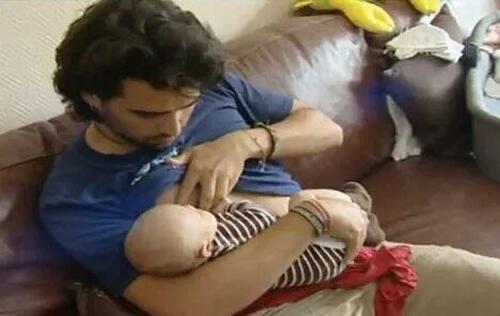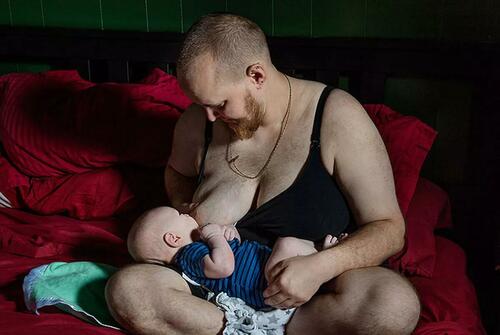
The Centers for Disease Control and Prevention (CDC) have come under fire over advice for transgender and non-binary parents seeking guidance on how to "chestfeed" their infants.
Several sections of the CDC's website advise those who have had gender-reassignment surgeries, or biological men taking hormones to grow breasts, how to commit child abuse to satisfy their fetish which couldn't possibly nourish a child. Several doctors, however have criticized the agency for failing to address the risk posed to children who drink milk produced by chemicals used in gender-reassignment medical operations.
In the CDC website’s section on "Health Equity Considerations" – found under its "Infant and Young Child Feeding Toolkit," the center declared that "Transgender and nonbinary-gendered individuals may give birth and breastfeed or feed at the chest (chestfeed)."
It also stated that "The gender identity or expression of transgender individuals is different from their sex at birth," and that, "the gender identity of nonbinary-gendered individuals does not fit neatly into either man or woman."
Under the CDC website’s section on "Breast Feeding," specifically an entry covering breastfeeding for those who have undergone breast surgery, the institute mentioned "chestfeeding." -Fox News
The CDC asks: "Can transgender parents who have had breast surgery breastfeed or chestfeed their infants?" To which it replied "yes," followed by an explanation.
"Some transgender parents who have had breast/top surgery may wish to breastfeed, or chestfeed (a term used by some transgender and non-binary parents), their infants," the website claims without evidence. "Healthcare providers working with these families should be familiar with medical, emotional, and social aspects of gender transitions to provide optimal family-centered care and meet the nutritional needs of the infant."
The site suggests that transgender parents "may need help with" maximizing milk production, and recommends supplementing with pasteurized donor human milk, or formula. It also notes that medication exists to induce lactation, and recommends avoiding medications that may inhibit or suppress lactation.

The Daily Mail spoke with several doctors who criticized the CDC - one of whom, Dr. Jane Orient, told the outlet: "The CDC has a responsibility to talk about the health risks, but they have been derelict in doing that."
Orient also said "we have no idea what the long-term effects on the child will be" if trans parents are using "all kinds of off-label hormones."
New York-based internal medicine physician, Dr. Stuart Fischer, told the Mail that it's "very hard to believe" that breast milk naturally-occurring in a biological female is the same as breast milk induced in a biological man - and that he's uncertain how the latter form of breast milk would affect infants.
"If it's been tested a handful of times, how would we know the long-range effect? The short-term is one thing, but the long-term in terms of physical and mental illness..."
"It's an emerging field, to put it mildly," he added.
The Centers for Disease Control and Prevention (CDC) have come under fire over advice for transgender and non-binary parents seeking guidance on how to “chestfeed” their infants.
Several sections of the CDC’s website advise those who have had gender-reassignment surgeries, or biological men taking hormones to grow breasts, how to commit child abuse to satisfy their fetish which couldn’t possibly nourish a child. Several doctors, however have criticized the agency for failing to address the risk posed to children who drink milk produced by chemicals used in gender-reassignment medical operations.
In the CDC website’s section on “Health Equity Considerations” – found under its “Infant and Young Child Feeding Toolkit,” the center declared that “Transgender and nonbinary-gendered individuals may give birth and breastfeed or feed at the chest (chestfeed).“
It also stated that “The gender identity or expression of transgender individuals is different from their sex at birth,” and that, “the gender identity of nonbinary-gendered individuals does not fit neatly into either man or woman.”
Under the CDC website’s section on “Breast Feeding,” specifically an entry covering breastfeeding for those who have undergone breast surgery, the institute mentioned “chestfeeding.” –Fox News
The CDC asks: “Can transgender parents who have had breast surgery breastfeed or chestfeed their infants?” To which it replied “yes,” followed by an explanation.
“Some transgender parents who have had breast/top surgery may wish to breastfeed, or chestfeed (a term used by some transgender and non-binary parents), their infants,” the website claims without evidence. “Healthcare providers working with these families should be familiar with medical, emotional, and social aspects of gender transitions to provide optimal family-centered care and meet the nutritional needs of the infant.”
The site suggests that transgender parents “may need help with” maximizing milk production, and recommends supplementing with pasteurized donor human milk, or formula. It also notes that medication exists to induce lactation, and recommends avoiding medications that may inhibit or suppress lactation.

The Daily Mail spoke with several doctors who criticized the CDC – one of whom, Dr. Jane Orient, told the outlet: “The CDC has a responsibility to talk about the health risks, but they have been derelict in doing that.”
Orient also said “we have no idea what the long-term effects on the child will be” if trans parents are using “all kinds of off-label hormones.”
New York-based internal medicine physician, Dr. Stuart Fischer, told the Mail that it’s “very hard to believe” that breast milk naturally-occurring in a biological female is the same as breast milk induced in a biological man – and that he’s uncertain how the latter form of breast milk would affect infants.
“If it’s been tested a handful of times, how would we know the long-range effect? The short-term is one thing, but the long-term in terms of physical and mental illness…”
“It’s an emerging field, to put it mildly,” he added.
Loading…






